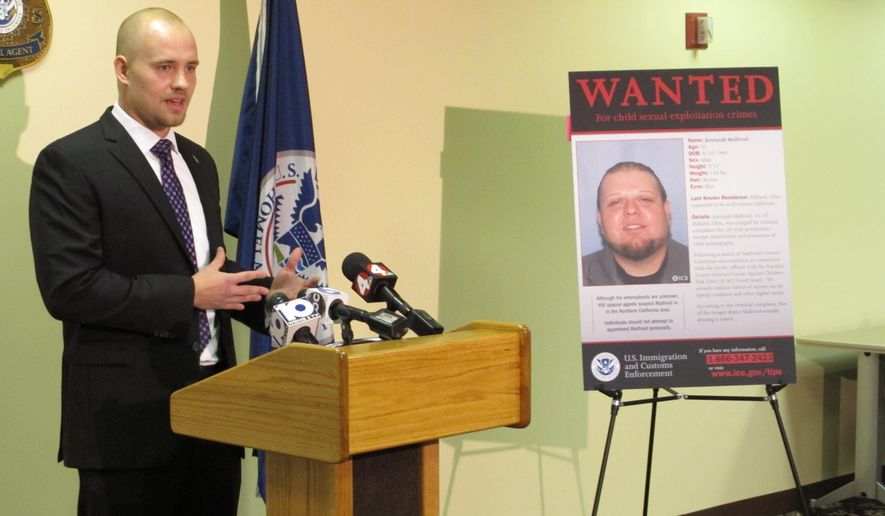The federal government’s “Operation Predator” app was credited last month with helping nab yet another man accused of trafficking in child pornography after a 33-year-old man surrendered in California, just days after federal authorities posted his image and story to Facebook and sent it to the more than 100,000 users who have downloaded the application.
At a time when the online world has made life easier for predators to share pornography or try to lure children to be exploited, U.S. Immigration and Customs Enforcement officials are trying to harness the same power to catch them through the Predator app and other online tools.
Launched in 2013, the app shares photos and details of suspects and asks the public to reply with tips on their whereabouts. It has a list of ICE’s current top 10 most wanted predators and can also push alerts when there’s a more urgent lookout.
“Social media is just so huge now. We’re very pleased with our app,” said Brian Widener, head of the computer forensics unit at ICE’s Cyber Crimes Center, who, in a recent interview, said the app had been responsible for two recent captures, including the 33-year-old man, Jeremiah Malfroid, who turned himself in to police in California in part because of pressure from having been featured on the app.
The app is just one of the tools ICE is harnessing. Another is manpower. Last year ICE graduated its second class of military veterans recruited and trained to track child pornography and online sexual exploitation, dubbed the HERO Corps.
David Blau, who served two tours in Iraq as a Marine — including spearheading the entry into Fallujah in 2004 — was part of the initial HERO Corps class that graduated in 2013. He said the program gives him a second battlefield to try to help his country.
After intense classroom training and a yearlong internship in Tampa, Florida, Mr. Blau moved last year to Greenville, South Carolina, where he is part of Homeland Security’s cybercrime investigations team, helping build cases against online predators and trying to rescue child victims. They also go to classrooms to talk to schoolchildren about online safety.
The program is specifically designed to take veterans, including wounded former military members, and get them ready for new careers in the U.S. Many of those who take part are former Special Operations troops and tend to be able to pick up the skills quite quickly.
Mr. Widener said trainees learn both the technological side of investigations and the law enforcement procedure side, so they are qualified and able to help develop cases that could eventually end up in a courtroom.
Mr. Blau said that, in the investigations he has been part of, most suspects usually admit to their crimes once police confront them with the child pornography photos taken from their computer or with the other evidence. Still, having all of the photos cataloged for evidence helps make the strongest possible case for prosecutors.
That means sometimes seeing things that can be hard to forget. But Mr. Blau said veterans are particularly able to compartmentalize and deal with that.
“Being veterans, wounded warriors, stuff like that, we’ve been through a lot, seen a lot,” he said. “Compared to the average person, we’re able to not grab it and ponder on it too much. You’ve just got to think of the positive note [that] you’re helping out these children.”
ICE hopes to run two classes this year, depending on their budget. The agency is accepting applications through mid-January for the first class, which will begin in April.
Mr. Widener said there’s a need for them since the problem of online predators is getting worse, judging by the record-setting years they continue to have for enforcement actions.
“Until we start to see that number level off, I would say it’s still a problem, and it’s going to continue to be a problem,” he said.
Mr. Blau said one of the victories of his job that hit home the most came in a talk he gave at career day at his son’s school. He took the kids through the potential dangers lurking on Facebook and other social media sites, and afterward a girl came up to him and said she was going to clear her account of people she didn’t really know.
Mr. Blau said parents should also take that message to heart, talk with their children about what they’re doing online and be aware that it’s much worse than when they were children themselves.
“It’s out there. When I tell people — the ones that do know what I do — I always tell them you need to have good communication with your children,” he said. “Learn what’s out there so you can know what to look for.”
• Stephen Dinan can be reached at sdinan@washingtontimes.com.




Please read our comment policy before commenting.